Ambuja Cement values the community as its foremost stakeholder. We uphold our commitment to community development through our dedicated corporate social responsibility arm. It operates at the grassroot level, conducting comprehensive assessments of community needs and priorities. This approach ensures that our interventions are evidence-based and yield meaningful and impactful outcomes. By actively engaging with the community, we strive to make a positive difference in their lives and contribute to their overall well-being.
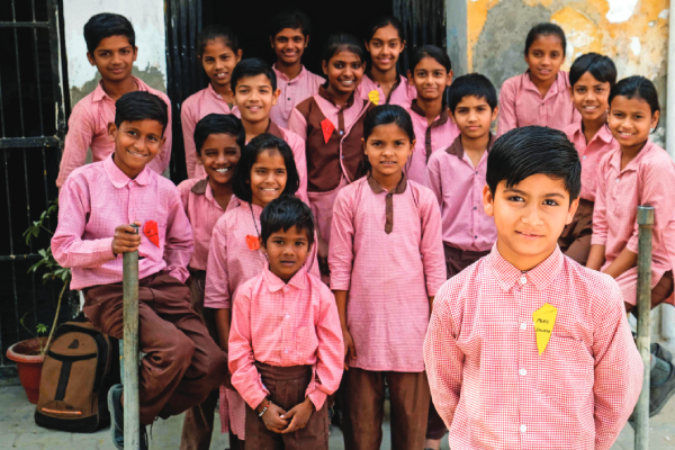
Stakeholders impacted

Community, Government
and NGOs
Material issues addressed
- CSR
- Health and safety
- Human rights
- Code of conduct
- Transparency and Corporate Governance
- Indirect economic impact
- Public policy and advocacy
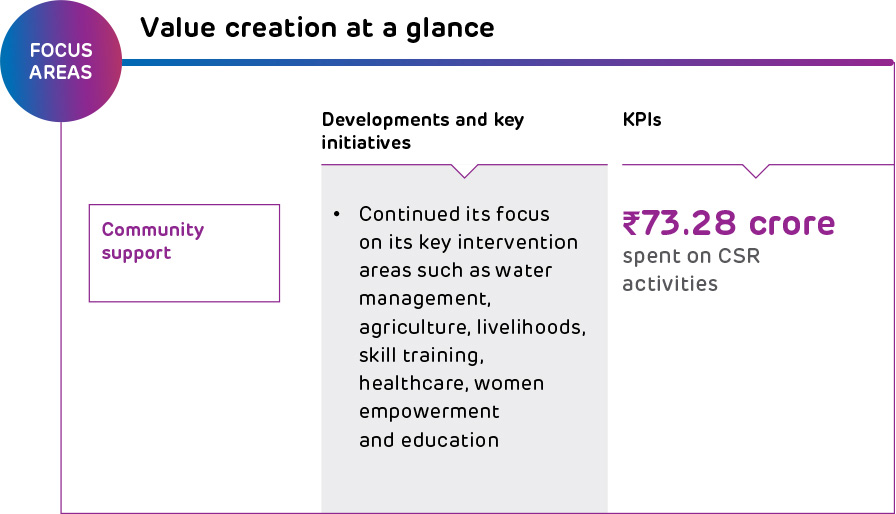
Key risks addressed
- Environment and sustainability
- Maintaining market position
- Water availability
- Licence to operate
- Building reputation
SDGs impacted
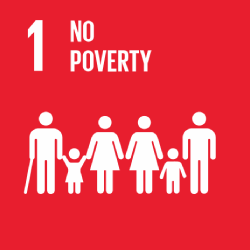
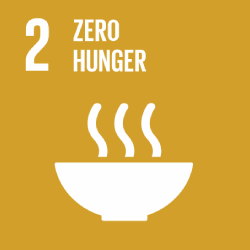

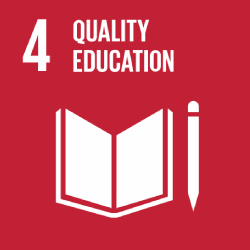
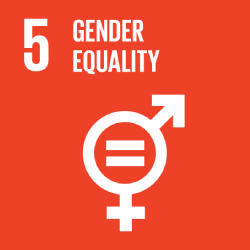
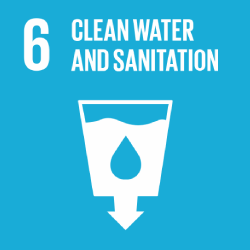
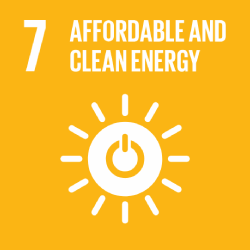
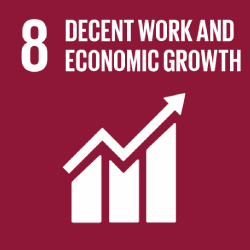
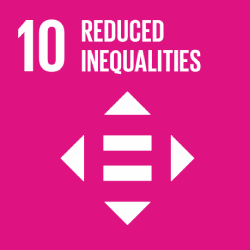
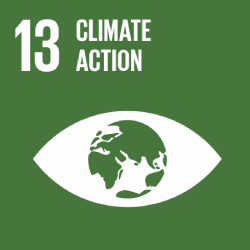
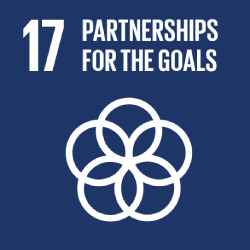
Capital-wise performance > Social capital
Overview
Through our CSR arm, we have positively impacted the lives of 2.5 million individuals residing in 2,680 villages across 21 districts of 12 states. Over the course of three decades, we have consistently implemented peoplecentric development initiatives, focusing on the core communities surrounding our Ambuja plants. These efforts have contributed to the overall socio-economic progress of the region. Our CSR arm facilitates a strong convergence between our plants and the communities by employing a participatory approach. We engage in regular and focused outreach activities to ensure effective collaboration. Our key programmes address a range of critical issues, including water conservation, environmental stewardship, livelihood opportunities for locals, healthcare and sanitation access for all, women empowerment, and education for children. By addressing these challenges, we secure our social license to operate as a responsible plant. The long-lasting impacts of our initiatives have brought prosperity to the communities we serve, aligning with the United Nation’s Sustainable Development Goals. To ensure programme effectiveness, we closely monitor and assess our initiatives through a dedicated cell, leveraging internal expertise and engaging with external experts and consulting organisations.
A structured approach to community development has ensured proactive engagement of the local community in several aspects. Forums such as Community Advisory Panel (CAPs) or Social Engagement Scorecard (SES) provide an opportunity to the community and other stakeholders to voice their thoughts and concerns that influence our future programme. At each plant, a CSR committee provides local plant specific insights that lead to strategic CSR, both relevant to business and the community stakeholder. In planning implementation of the community development programmes, our CSR arm works very closely with the local and central government by optimally utilising opportunities to scale through convergence with various government schemes. It is with this strategic partnership that we have been able to increase the scale of the programmes beyond Ambuja’s immediate villages and extends households’ outreach. The efforts of our CSR arm are being recognised and applauded with prestigious awards and recognition both by the government as well as other organisations. Sustainable practices adopted by Ambuja such as Site-Specific Impact Assessment provided an opportunity to engage with both internal as well as external stakeholders to review the opportunities and business risks for planning stakeholder engagement.
Our Board and the corporate CSR committee have been at the forefront in guiding the focus for CSR. The comprehensive CSR policy detailing specific aims and objectives for community development aligns with Schedule VII of the Companies Act 2013. In line with section 135 (1) of the Companies Act, Ambuja Cement focused on getting the impact assessments done for its two critical programmes. The findings of the assessments are utilised for developing future programme strategies.
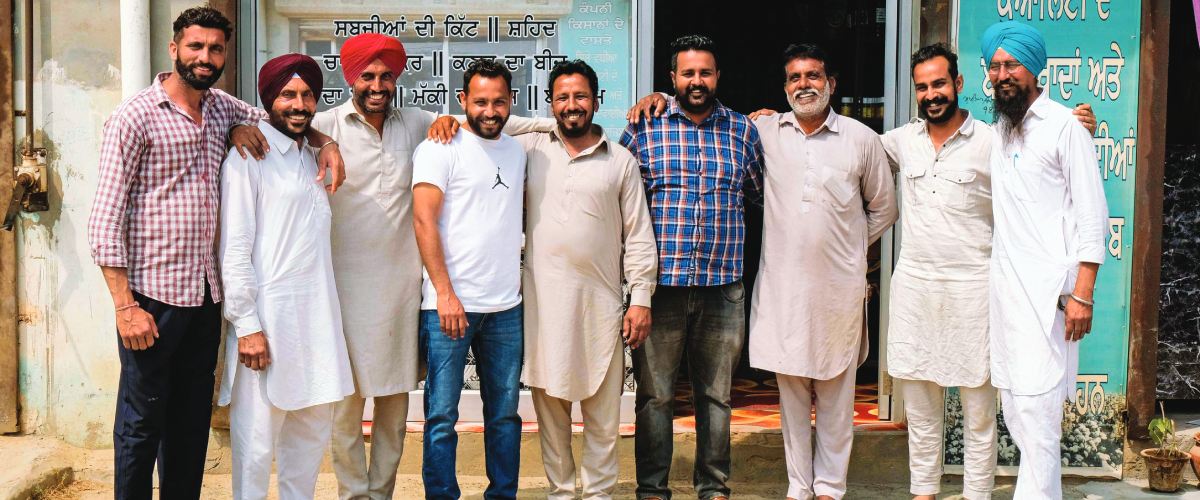
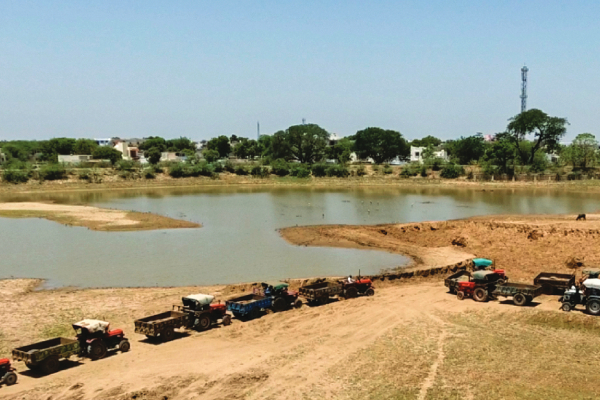
Water resource management
Through our Water Resource Management Programme, we create access to safe drinking water, build systems for harvesting and conservation and create water literacy for efficient and sustainable use of water. Access to water has been one of our major focus in CSR which helps increase family incomes and generate livelihoods. This has enabled us to be an 8x Water Positive Organisation.
Agriculture
Under the Agro-Based Livelihood, emphasis is laid on promoting sustainable agriculture initiatives. We nurture farmers into groups so that they can collectively procure, produce and market together. Efforts such as system of rice intensification, organic farming, introduction of new technology, improving crop yield and overall productivity. We have 16 Farmer Producer Organisations with over 7,600 farmers as members. We encourage farmers to marry traditional wisdom with new technologies and practices by promoting sustainable farming models. We also guide farmers to adapt environment friendly approaches by using solar pumps for irrigation, promotion of microirrigation, responsible use of pesticides, enhancing soil health and biodiversity.
During the reporting period, we focused on soil health by creating awareness and reaching over 2.5 lakh community members on topics like deteriorating soil health, best practices to be followed amongst others. With more farmers joining in, we covered 4,637 acres of land under soil and moisture conservation intervention.

Supporting the farming community to cope with financial risk of crop failure due to vagaries of natural crop insurance is promoting cultivation and animal insurance for goatery, poultry and aquaculture-based livelihood. Thus we have developed a local cadre to create sustainable agriculture models like Pashu Sakhis (animal health volunteers), lead farmers, agriculture volunteers. Through them we also encourage farmers to turn village entrepreneurs through small processing units, farm machinery banks etc.
Due to our long-standing partnership as an implementation partner with Better Cotton, we were
- Around 20,735 households reached through water conversation, micro-irrigation and drinking water project
- 1.08 MCM additional surface water storage created through water harvesting structures which includes ponds, check dams, khadins and farm ponds
- 2,368 farmers brought under micro-irrigation with 2,242 hectares for ‘more crop per drop’. Additionally, 852 small and marginal farmers received irrigated water through group irrigation schemes covering 212 hectares. Irrigation channel lining of 7,877 meters was created to reduce conveyance losses. About 56 farmers covered under solar irrigation with 37 hectares land area
- 736 households built Rooftop Rainwater Harvesting Systems (RRWHS) to avail water just outside their doorstep. Additionally, 14 community based RRWHs created.
- Our water initiatives made us the Best Implementation Agency the Best Implementation Agency under Watershed Development by NABARD and being facilitated by KVK Mansa
Capital-wise performance > Social capital
felicitated for our 10 year partnership bringing together 2.1 lakh farmers to change their practices and follow improved crop management practices.
- 2.6 lakh beneficiaries reached through the Agro-Based Livelihood Programme
- 4 Farmer Producer Organisation (FPO) supplied 78,548 MT Biomass to the company in 2022
- Over 10,000 Households involved in Allied Agriculture with 50-60% female participation
- 2.26 lakh Farmer outreach in Integrated Crop Management with 10% women participation
- Under Biodiversity, 7.40 lakh plantation carried out
- Best NGO Award by Krishi Vigyan Kendra (KVK) Bathinda for work in Agriculture
- 23,900 acres prevented from open burning of paddy residue
Skills
Our 16 Skill & Entrepreneurship Development Institutes (SEDI) across 10 states focus on encouraging rural youth to get skilled by providing them with training, placement and business opportunities. This not only offers them a trade but also helps to lift their families out of poverty. Over 95,000 rural youth have been trained with immediate placement support while some have opened their own businesses.

- 7,508 Youth trained with a Placement rate of 75%
- 44% Female enrollment
- A new centre was inaugurated in Bilaspur and a Sub-Centre was inaugurated in SEDI Surat. 2 New Skilling Centres (SEDI) – Noida in UP; Sanand in Gujarat
- 11 Alumni Chapters formed (Alumni Chapter is a support group of SEDI alumni working in major cities)
- 97 youth trained under Enterprise Development, 60 have started new businesses with average monthly income of `15,000 per month.
Education
It is our responsibility to ensure that rural children in our core areas are offered primary and secondary quality education. While we focus on offering infrastructure and WASH services, we also have introduced reading and sports to inculcate this habit in children. Under our Ambuja Manovikas Kendra (AMK), we continue to offer training and education to specially abled children so that they can excel in life.
- 56 schools were involved in organising sports competitions in the school premises or participating in the local level competitions. A few students were also selected in district level competition
- 8 new libraries set up in communities to create a habit of reading
- 37 WASH structures were provided to reduce the school dropout rate and create an enabling environment for children
- Around 35 students in AMK have started using water therapy through the newly built swimming pool.
- A group of 18 members was formed including parent of AMK children and the community who encourage the students to sell their products under the entrepreneurship programme
Community health
Our Community Health initiative empowers families to lead better lives by promoting primary healthcare, preventive and promotive health. We focus on Maternal, Child & Adolescent Health, Communicable and Non-Communicable Diseases, WASH and Curative Health including addressing malnutrition.
One of our latest intervention launched is the Educational Training and Knowledge Enhancement to healthcare professionals and volunteers on Cancer in collaboration with ABS (UK), ABSI (India) and the Tata Cancer Care Programme. The first event was held in Chandrapur wherein health experts joined in from UK and India to provide training and guidance to health professionals along with screening.
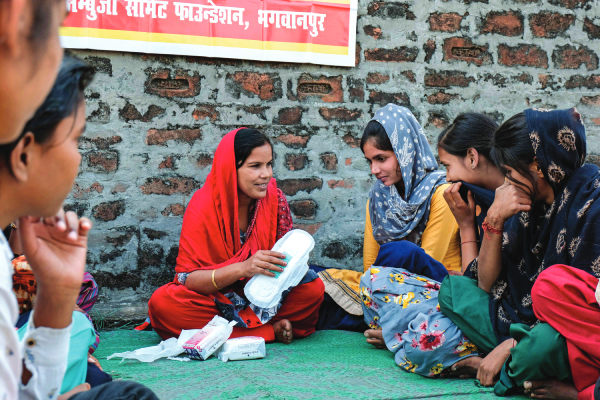
- 78,000 households reached through Community Health program78,000 households reached through Community Health programme
- Through our village health functionaries Sakhis, we have managed to secure a 99% rate of Institutional Deliveries in villages.
- Our Healthcare Centre has enabled us to reach about 1,13,000 truckers on HIV/AIDs prevention, services of STI, safety, eyesight and regular preventive check-ups for hypertension and diabetes are organised.
- The Menstrual Hygiene Management Programme covers 14 locations with 1,733 SHGs
- Our Malnutrition Programme is operational in 144 villages benefitting over 19,000 children
- 2 new community clinics set up making it a total of 12 community clinics.
Women empowerment
We empower women to be social leaders as we believe that women play a critical role across all community issues. Thus, we focus on their socio-economic strengthening, form them into groups to build institutions and encourage social participation and inclusion across other programmes.
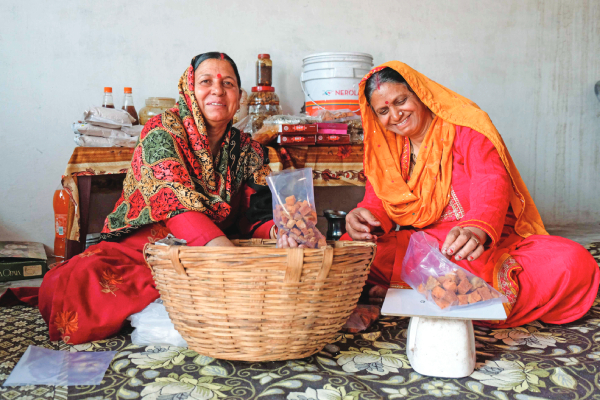
- We collectivise women to form Self-Help Groups (SHGs) to inculcate a habit of savings and also work together on income generation activities and social issues. 351 new SHGs were formed with a total of 3,136 SHGs across locations. 73% of women from landless & marginal households. With regular savings, additional corpus was `2.5 crores.
- 10,990 women are involved in micro enterprise promotion activity involved in stitching, making pickles, furniture’s, spices, selling food, making cleaning and hygiene products or reviving traditional craft
- 3 new Federations were formed in 2022 making it a total of 11 women federations with over 19,000 women members
- 25% women are involved in Farmer Producer Organisations and play decision makers as part of a few organisations.
- Ambuja Cement received the ICC Social Impact Award & FICCI CSR Award for its exceptional work in the women empowerment category
Capital-wise performance > Social capital
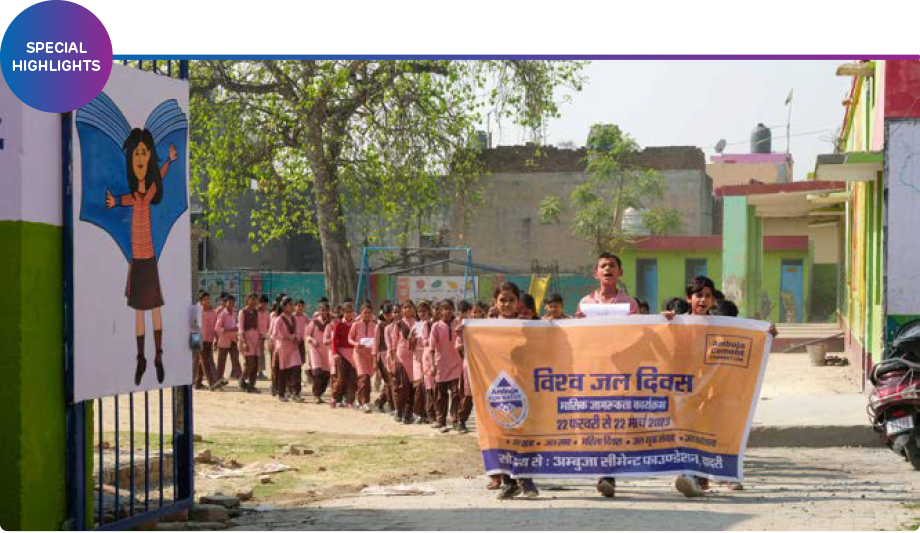
Ambuja for Water Campaign
Our CSR arm is putting rural water at the top of its agenda, in a heightened effort to highlight the imperative of this issue for rural sustainability and overall national prosperity. In view of this focus, we launched a one-month campaign culminating on World Water Day, March 22, 2023. Several activities were held across all our villages.
On Women’s Day, awareness was created amongst women on the judicious use of water, the latest microirrigation technologies and invitation for participating in various activities. SEDI students were involved in poster-making and speech competitions. Trainees prepared interesting posters and delivered inspiring speeches with eye-opening messages through their role play.
The campaign concluded on World Water Day, March 22, with awareness on irrigation, water conservation and management and the role and importance of water in communities. Across locations, Govt. Officials, Guest Lecturers and other Dignitaries were invited for the event to create awareness on available government schemes, best utilisation of water in agriculture, water-borne diseases and its management. In a few locations water structures like farm tanks, hand pumps, solar drinking water pumps and RRWHS (Roof Rainwater Harvesting Structure) were inaugurated.
A Jal Yatra was organised with various stakeholders like farmers chanting slogans in the fields, school students walking with placards in the communities and women walking with water pots in their heads raising awareness on water conservation. Jal Sabha’s were held across locations with community members and other stakeholders coming together to discuss the issue of Water. The village samitis and leaders conducted a mapping of water sources and were also advised to design a security plan. Women were made aware about the various water borne diseases with highlighting its issue with animal health volunteers. Farmers were made aware of the judicial use of water and were encouraged to adopt efficient practices like setting up drip or sprinkler irrigation systems.
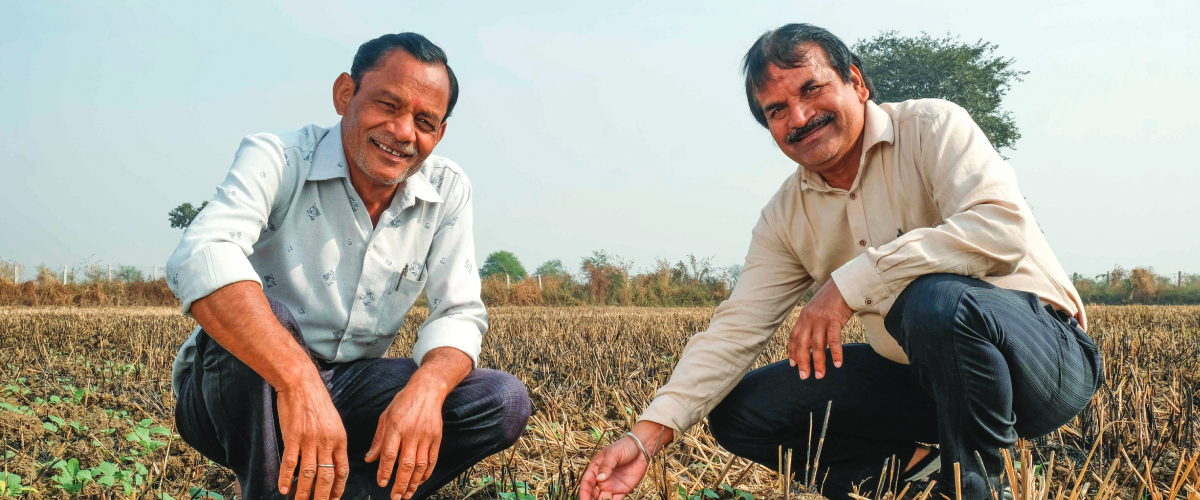
Considering the increased importance of awareness on soil health, on the occasion of World Soil Health Day (December 05), our CSR arm initiated a panIndia campaign focusing on all internal and external stakeholders with multiple initiatives. The campaign ran across all locations for 10 days with a series of activities and initiatives through the entire week engaging varied stakeholders in and around the site locations. Target audiences included school children, school management committees, SEDI trainees, women & self- help groups, farmer clubs, local panchayats and partners. Over 1,45,000 beneficiaries participated in training sessions, pledges, rallies, exhibitions, painting competitions and workshops. The campaign concluded with a virtual event engaging external stakeholders including NGOs’ corporates, government institutions and other expert organisations to come together on one common platform to talk about Soil Health. The event promoted sharing of experiences, best practices, challenges and ways forward. It further focused on exploring future opportunities for partnerships both in strategising and implementing soil health and climate action initiatives.

- Ambuja Cements won 1st Runner-up in “Best Practices challenge forum on Water Management” by the United Nations Global Compact Network, India
- We were honored with Institute of Chartered Accountants of India (ICAI) Award 2022 for excellence in financial reporting for FY 2021-22 in Non-Profit Sector
- Our CSR arm won the FICCI CSR Award in Women Empowerment Category
- Awarded ‘Most Impactful CSR’ category at the Metropolis Healthcare heroes of India
- Our CSR arm certified once again as a ‘Great Place to Work’ in the Non-Profit Category